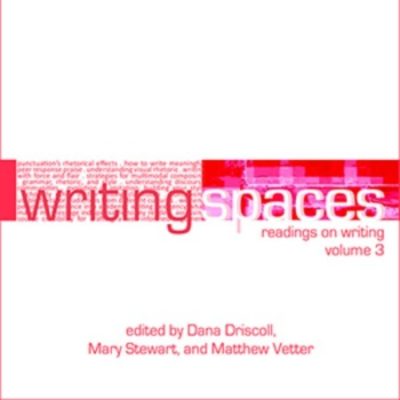15 Marjoria Stewart’s “Weaving Personal Experience into Academic Writings“
Writing Spaces Volume 3
Personal experience may be something first-year writing instructors or students don’t see as an asset or a part of academic writing. However, one’s personal experience can richly aid in developing one’s academic writing and research on a topic. In this chapter, Stewart does not debate whether narrative is “appropriate” for academic writing. Rather, she addresses how personal narrative is powerful, and offers tools on how to best integrate it. Stewart’s goal in this chapter is to model to students various ways that she, as well as student writers, can best weave personal narrative into research and academic writing. When personal experience and research overlap, a space for self discovery emerges. Personal narrative can successfully become a framing device, an example, or point of context for academic writing.
“Many of you have been taught not to use the word ‘I’ in your academic writing; not to include anything that does not directly relate to that mysterious thing called a ‘thesis statement;’ and not to include anything personal in your writing. The opening of this essay has broken all of those so-called rules.”
MLA Citation Examples
Works Cited
Stewart, Marjorie. “Weaving Personal Experience into Academic Writing.” Writing Spaces: Readings on Writing Volume 3, edited by Dana Driscoll, Mary Stewart, and Matthew Vetter, Parlor Press, 2020, pp. 162-174.
In-text citation
“Many of you have been taught not to use the word “I” in your academic writing; not to include anything that does not directly relate to that mysterious thing called a “thesis statement;” and not to include anything personal in your writing. The opening of this essay has broken all of those so-called rules” (163).
APA Citation Examples
References
Stewart, M. (2020). Weaving personal experience into academic writing. In Dana Driscoll, Mary Stewart, and Matthew Vetter (Eds.), Writing Spaces: Readings on Writing, vol. 3 (pp. 162-174). New York: Parlor Press.
In-text citation
“Many of you have been taught not to use the word “I” in your academic writing; not to include anything that does not directly relate to that mysterious thing called a “thesis statement;” and not to include anything personal in your writing. The opening of this essay has broken all of those so-called rules” (p. 163).
Chicago Citation Examples
Bibliography
Stewart, Marjorie. “Weaving Personal Experience into Academic Writing,” in Writing Spaces: Reading on Writing Volume 3, ed. Dana Driscoll, Mary Stewart, and Matthew Vetter, (New York: Parlor Press, 2020), 162-174.
In-text citation
“Many of you have been taught not to use the word “I” in your academic writing; not to include anything that does not directly relate to that mysterious thing called a “thesis statement;” and not to include anything personal in your writing. The opening of this essay has broken all of those so-called rules” (Stewart, 2020, 163).


